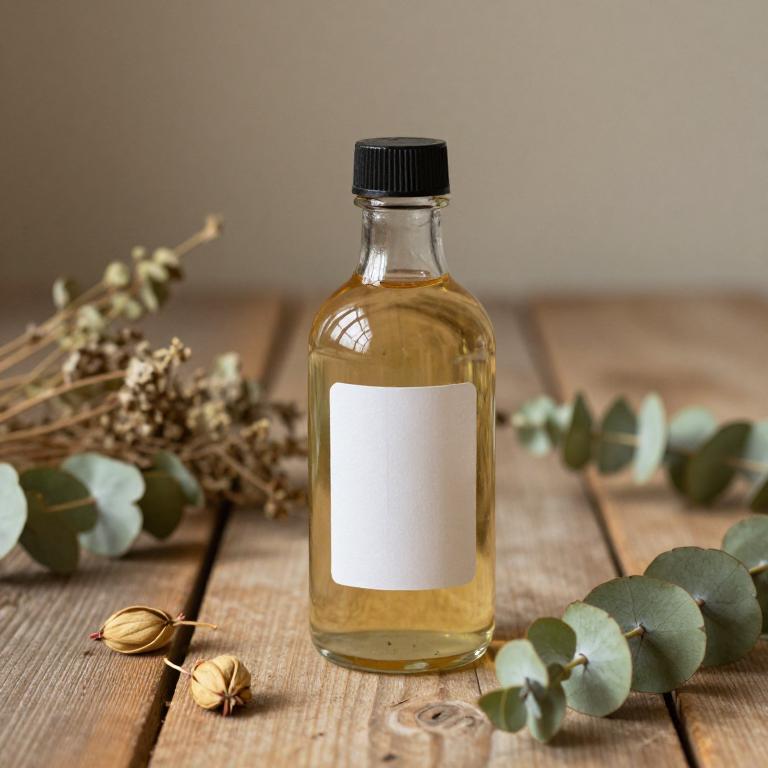10 Best Herbal Syrups For Bronchitis

Herbal syrups for bronchitis are natural remedies that combine traditional herbal ingredients with soothing agents to help alleviate symptoms such as coughing, congestion, and inflammation in the respiratory tract.
Common herbs used in these syrups include licorice root, eucalyptus, thyme, and ginger, which are known for their anti-inflammatory, expectorant, and antimicrobial properties. These syrups are often preferred by individuals seeking alternative or complementary treatments to conventional medications, especially for mild to moderate bronchitis cases. They can help ease mucus production, reduce irritation, and support the body's natural healing process.
However, it is important to consult with a healthcare provider before using herbal syrups, especially for individuals with allergies or those taking other medications.
Table of Contents
- 1. Thyme (Thymus vulgaris)
- 2. Eucalyptus (Eucalyptus globulus)
- 3. Ginger (Zingiber officinale)
- 4. Peppermint (Mentha piperita)
- 5. Ceylon cinnamon (Cinnamomum verum)
- 6. Fennel (Foeniculum vulgare)
- 7. Rosemary (Rosmarinus officinalis)
- 8. Licorice (Glycyrrhiza glabra)
- 9. Chaste tree (Vitex agnus-castus)
- 10. Chamomile (Matricaria chamomilla)
1. Thyme (Thymus vulgaris)

Thymus vulgaris, commonly known as thyme, is a popular herb used in herbal syrups for the treatment of bronchitis due to its potent antimicrobial and anti-inflammatory properties.
These syrups typically contain essential oils extracted from thyme leaves, which are rich in compounds like thymol and carvacrol, known to help alleviate coughing and reduce mucus production. The warm, aromatic qualities of thyme syrup make it soothing to the throat and can help ease breathing in individuals suffering from bronchial inflammation. While thyme syrup is often used as a complementary therapy, it should not replace prescribed medical treatments for chronic or severe bronchitis.
Regular use of thyme-based syrups may support respiratory health and provide natural relief for symptoms associated with both acute and chronic bronchial conditions.
2. Eucalyptus (Eucalyptus globulus)

Eucalyptus globulus, commonly known as eucalyptus or gum tree, is often used in herbal syrups to help alleviate symptoms of bronchitis.
These syrups typically contain extracts from the leaves of the eucalyptus plant, which are known for their anti-inflammatory and antimicrobial properties. The active compounds, such as eucalyptol and cineole, can help reduce mucus production and ease respiratory congestion. When used as part of a holistic approach, eucalyptus globulus herbal syrups may support easier breathing and soothe irritation in the airways.
However, it is advisable to consult a healthcare professional before using these syrups, especially for individuals with underlying health conditions or those taking other medications.
3. Ginger (Zingiber officinale)

Zingiber officinale, commonly known as ginger, has been traditionally used for its anti-inflammatory and bronchodilating properties, making it a popular ingredient in herbal syrups for bronchitis.
These syrups often combine ginger with other herbs like eucalyptus, licorice, and thyme to enhance their soothing and expectorant effects. The active compounds in ginger, such as gingerol and shogaol, help reduce mucus production and ease respiratory discomfort. Herbal syrups containing zingiber officinale are typically used as a natural remedy to alleviate symptoms like coughing, congestion, and inflammation in the airways.
While they may offer relief, it is advisable to consult a healthcare professional before using them, especially for chronic or severe bronchitis cases.
4. Peppermint (Mentha piperita)

Mentha piperita, commonly known as peppermint, is often used in herbal syrups to alleviate symptoms of bronchitis due to its soothing and decongestant properties.
These syrups typically contain a concentrated form of peppermint oil, which helps to ease coughing and reduce inflammation in the airways. The menthol in peppermint provides a cooling effect that can help relieve chest congestion and make breathing easier. Additionally, peppermint syrup may help soothe the throat and reduce irritation, making it a popular choice for those suffering from persistent coughs associated with bronchitis.
While generally considered safe, it is advisable to consult a healthcare professional before using peppermint syrup, especially for children or individuals with existing health conditions.
5. Ceylon cinnamon (Cinnamomum verum)

Cinnamomum verum, commonly known as true cinnamon, has been traditionally used in herbal syrups to support respiratory health, particularly in the treatment of bronchitis.
The essential oils and compounds found in cinnamon, such as cinnamaldehyde and eugenol, possess antimicrobial and anti-inflammatory properties that may help alleviate symptoms like coughing and mucus production. When prepared as a syrup, cinnamon can soothe the throat and reduce irritation, making it a comforting remedy for those suffering from bronchial inflammation. However, it is important to consult a healthcare professional before using cinnamon syrups, especially for individuals with allergies or those taking other medications.
While not a substitute for conventional treatments, cinnamon-based syrups may offer complementary relief when used as part of a holistic approach to managing bronchitis.
6. Fennel (Foeniculum vulgare)

Foeniculum vulgare, commonly known as fennel, is often used in herbal syrups to alleviate symptoms of bronchitis due to its expectorant and antispasmodic properties.
These syrups help loosen mucus in the airways, making it easier to cough up and reducing congestion. The essential oils in fennel, such as anethol, have mild anti-inflammatory effects that may soothe irritated bronchial tissues. When taken as a syrup, fennel is generally considered safe for most adults, though it should be used with caution in children and those with specific allergies.
It is often combined with other herbs like thyme or licorice in bronchitis formulations to enhance its therapeutic effects.
7. Rosemary (Rosmarinus officinalis)

Rosmarinus officinalis, commonly known as rosemary, is often used in herbal syrups to support respiratory health, particularly in cases of bronchitis.
These syrups typically contain rosemary extract, which is valued for its anti-inflammatory and antioxidant properties that may help reduce bronchial irritation and mucus production. The aromatic compounds in rosemary also have a soothing effect on the respiratory tract, potentially easing coughing and improving breathing. While not a substitute for medical treatment, rosemary herbal syrups are often used as a complementary therapy to alleviate symptoms.
However, it is important to consult with a healthcare provider before using such remedies, especially for individuals with underlying health conditions or those taking other medications.
8. Licorice (Glycyrrhiza glabra)

Glycyrrhiza glabra, commonly known as licorice root, has been traditionally used in herbal medicine for its soothing effects on the respiratory system.
Licorice root syrup is often prescribed to alleviate symptoms of bronchitis, such as coughing and inflammation of the airways, due to its expectorant and anti-inflammatory properties. The active compound, glycyrrhizin, helps reduce mucus production and soothe irritated tissues in the bronchial passages. However, prolonged use of licorice syrup may lead to side effects like hypertension and fluid retention due to its mineralocorticoid-like effects.
As a result, it is typically recommended as a complementary therapy under the guidance of a healthcare professional.
9. Chaste tree (Vitex agnus-castus)

Vitex agnus-castus, commonly known as chasteberry, is a herbal remedy that has been traditionally used to support respiratory health.
While it is not a direct treatment for bronchitis, some studies suggest that its anti-inflammatory and expectorant properties may help alleviate symptoms such as coughing and mucus buildup. Herbal syrups containing vitex agnus-castus are often used as complementary therapy to support the body's natural healing process. These syrups are typically made by combining the dried fruit of the plant with honey or other natural sweeteners.
However, it is important to consult a healthcare professional before using vitex agnus-castus, especially for individuals with chronic respiratory conditions or those taking other medications.
10. Chamomile (Matricaria chamomilla)

Matricaria chamomilla, commonly known as German chamomile, is often used in herbal syrups to support respiratory health, including the treatment of bronchitis.
These syrups are traditionally valued for their soothing and anti-inflammatory properties, which may help alleviate coughing and reduce irritation in the airways. Chamomile contains compounds like apigenin and bisabolol, which are believed to have mild antispasmodic and expectorant effects. When used as a complementary therapy, chamomile syrup may help ease symptoms and promote easier breathing in individuals with bronchitis.
However, it is important to consult a healthcare professional before using herbal remedies, especially for chronic or severe respiratory conditions.